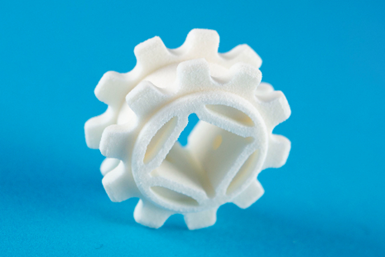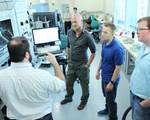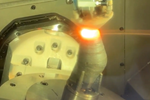DSM Polypropylene Powder Suitable for Range of Applications
Arnilene boasts balance of properties and food contact approval in Europe.

An SLS 3D-printed conveyer belt sprocket using DSM’s Arnilene AM6002 (P).
Royal DSM’s Arnilene AM6002 (P) is a polypropylene material which is well-suited for 3D printing a wide range of applications across multiple industries. As manufacturers look to utilize additive manufacturing to keep plants running during times of crisis, 3D printing production equipment parts locally helps save time and cost, as well as secure operations to avoid supply chain disruption.
Arnilene AM6002 (P) has food contact approval in Europe, making it well-suited for applications in the food and beverage or nutrition industries, such as conveyor belt guides, sprockets, slides, dosing blocks and creepers. With polypropylene being used extensively in the automotive sector, DSM’s Arnilene AM6002 (P) is an optimal choice for applications such as dashboard components, interiors and many others in this sector. The material is also suitable for prototyping polypropylene end-use parts.
According to the company, Arnilene AM6002 (P) offers robust mechanical, chemical and thermal properties, food contact approval in Europe and the ability to print complex designs. This easy-to-process material can be run on existing selective laser sintering platforms. The material is also hydrophobic and can be used to print large batches of engineering-grade, tough parts without compromising on economics or ease of post processing. Arnilene AM6002 (P) can be post-processed via automated post processing, as well as dyeing. With a 90% reuse rate, the material produces less waste, making it a sustainable solution.
Related Content
-
What is Powder Bed Fusion 3D Printing?
Whether in metal or polymer, with a laser or an electron beam, powder bed fusion (PBF) is one of the most widely used 3D printing techniques.
-
AM 101: Digital Light Synthesis (DLS)
Digital Light Synthesis (DLS) is the name for Carbon's resin-based 3D printing process. How it works and how it differs from stereolithography.
-
ActivArmor Casts and Splints Are Shifting to Point-of-Care 3D Printing
ActivArmor offers individualized, 3D printed casts and splints for various diagnoses. The company is in the process of shifting to point-of-care printing and aims to promote positive healing outcomes and improved hygienics with customized support devices.











